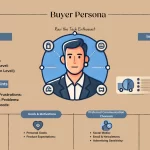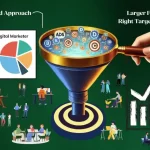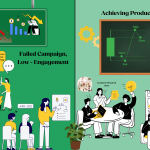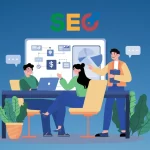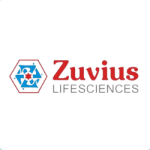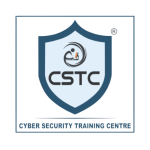The Ultimate Guide to Digital Marketing
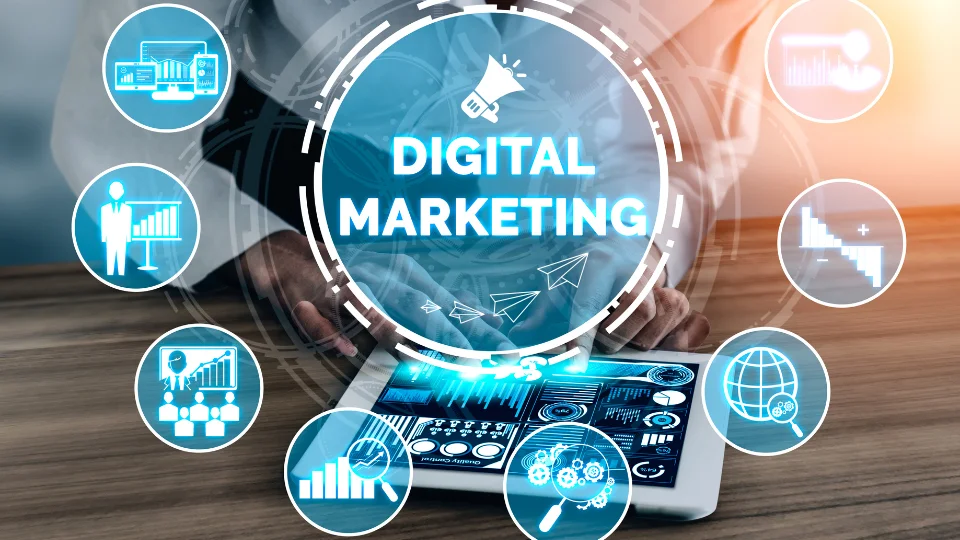
Expert Insights for Entrepreneurs and Marketers
Introduction
Are you looking to level up your business growth but feel like something is missing? Our Digital Marketing Guide is here to help you master the best strategies, tips, and practices to stay ahead and achieve real results.
In this guide, we’re diving deep into key marketing questions that every business owner needs answers to. By the end of this article, you’ll not only understand what successful marketing looks like but also feel confident in applying these strategies to boost your brand’s visibility, customer engagement, and revenue. Get ready to shift from basic knowledge to a strategic powerhouse that drives real, measurable results.
1. Which Company is No. 1 in Digital Marketing?
Wondering what sets marketing leaders apart? It’s not just size—it’s their ability to innovate and adapt.
Companies like Amazon and HubSpot lead because they prioritize customer focus, data-driven strategies, and continuous evolution. Amazon’s recommendation engine, driving 35% of its revenue, showcases the power of personalization. HubSpot’s blend of SEO, content, and analytics proves that an adaptable, inbound strategy is key.
The true No. 1 in online marketing isn’t about being the biggest—it’s about being the most innovative and adaptable. Learn from these leaders: use data, personalize campaigns, and optimize the customer journey for success.
For a deeper understanding of how newly established D2C brands are using these strategies to thrive, explore this specially curated article. It’s packed with real-life case studies and insights that you can apply to your own business to drive growth.
Success is about innovation and adaptability. Apply these principles, and lead in your own market.
2. Which Category is Best for Online Marketing?
Certain industries gain more from marketing than others.
E-commerce brands, especially in fashion and beauty, excel with social media and influencer marketing. B2B companies thrive with content marketing and LinkedIn strategies. SaaS brands leverage SEO and educational content to attract and nurture customers.
According to research, 92% of B2B marketers view content marketing as a crucial part of their strategy. E-commerce brands that integrate social media often experience a 10-15% boost in sales. Brands like Nykaa succeed with influencer marketing, while SaaS companies such as SEMrush use webinars and blog content to build trust and generate leads. Select the approach that aligns with your business goals for optimal results.
3. Which Digital Marketing Strategy is Best?
The ideal online marketing strategy blends short-term wins with long-term growth.
SEO and content marketing are essential for sustainable traffic and credibility. PPC is effective for immediate visibility. Social media boosts brand recognition and user interaction, creating a stronger connection with your audience. Email marketing keeps customers engaged and drives repeat business.
If you want fast results, prioritize PPC and social media. To achieve consistent, long-term results, invest in content marketing and SEO. Zomato is known for its clever social media engagement, and CRED leverages PPC for rapid growth. Combining these strategies often leads to the best outcomes.
4. Who Are the Top Online Marketers?
Leading digital marketers excel because they know their audience, provide value, and adapt to changes quickly.
Neil Patel is known for breaking down complex SEO and content tips into simple, actionable advice. Rand Fishkin from Moz and SparkToro specializes in audience research and insights. Gary Vaynerchuk leverages storytelling and social media to build strong brand connections.
In India, Sorav Jain is recognized for effective social media strategies, while Pradeep Chopra of Digital Vidya is a pioneer in marketing education. Analyzing the work of these experts can help you sharpen your strategies.
5. What Are the 10 Main Types of Online Marketing?
Marketing has many forms, each with unique benefits. Here are 10 key types:
- SEO (Search Engine Optimization): Boosts organic traffic but needs time to show results.
- Content Marketing: Builds credibility by providing valuable, informative content.
- PPC (Pay-Per-Click Advertising): Quick results but can be costly.
- Social Media Marketing: Increases brand visibility and strengthens audience interaction.
- Email Marketing: High ROI but needs a quality email list.
- WhatsApp Marketing: Ideal for direct communication and instant updates. Helps brands send tailored messages, promotions, and alerts to their customers.
- Influencer Marketing: Extends reach but requires selecting the right partners.
- Affiliate Marketing: Good for expanding reach through performance-based partnerships.
- Video Marketing: High engagement but can be resource-intensive.
- Audio Marketing (Podcasts): Builds trust and positions brands as thought leaders.
Choose the types that align with your goals. E-commerce brands thrive with SEO, social media, and email or WhatsApp marketing. B2B and SaaS companies often see great results with content marketing and LinkedIn strategies.
6. Why is Content Marketing the Most Effective Form of Online Marketing?
Content marketing stands out as the most effective type of digital marketing. It establishes credibility, informs your audience, and elevates your brand as an industry leader. Over time, it brings consistent organic traffic and leads, reducing the need for continuous ad spending.
Creating high-value content like blog posts, guides, and videos attracts visitors and keeps them engaged. HubSpot is an example of success, using SEO-focused content to draw millions of visitors and generate leads consistently.
Other forms like email and video marketing are impactful, but content marketing is the core that supports them. It powers email campaigns, boosts social media engagement, and even enriches WhatsApp updates, giving people more reasons to stay connected to your brand.
Think of content marketing as building a library of helpful resources that your audience keeps coming back to. Pairing it with channels like email and WhatsApp helps you expand your reach, build trust, and make your brand the go-to source for valuable information.
7. What Are the 7 C’s of Digital Marketing?
It’s easy to feel overwhelmed by the many marketing strategies available. The 7 C’s help simplify where to focus:
- Customer: Know your audience well and understand their needs.
- Content: Create valuable and engaging content that solves customer pain points.
- Convenience: Make sure your content is easy to access and consume on all platforms.
- Communication: Keep open, two-way communication to build trust.
- Community: Foster a sense of belonging through social media groups or online forums.
- Consistency: Ensure your branding and messaging are uniform across all channels.
- Conversion: Design strategies that guide your audience toward taking action, like signing up or making a purchase.
Implementation Tips: Have a deep understanding of your customer persona, then craft content that resonates with them. Optimize your website to be mobile-friendly, easy to navigate, and fully SEO-ready. Engage your audience through regular updates and interactive content to foster community and maintain consistency.
Examples: Glossier has built a loyal community through consistent communication and user-generated content, leading to higher conversion rates.
Mastering these 7 C’s will give your marketing a solid foundation that helps you build meaningful connections and drive results.
What Are the Benefits of Digital Marketing?
Many businesses worry about the cost and effectiveness of their marketing efforts. Marketing changes the game with a range of powerful benefits:
- Cost-effectiveness: Generally more affordable than traditional advertising.
- Scalability: Adjust campaigns to fit your budget and goals easily.
- Targeted Reach: Advanced targeting helps you reach the right audience at the right time.
- Measurable Results: Use tools that provide data and analytics for clear performance tracking.
- High Engagement: Interactive content through social media and emails boosts user interaction.
- Data-Backed Insights: According to HubSpot, businesses that use online marketing see a 78% higher chance of better ROI. Companies leveraging targeted ads report up to a 20% increase in sales.
Success Stories: Dollar Shave Club went viral with targeted video marketing, while Airbnb uses personalized digital strategies to scale globally.
Imagine the growth potential when you can reach your audience precisely and affordably. These benefits make online marketing a must for businesses looking to expand effectively.
How to Use Digital Marketing?
Leverage the RACE framework (Reach, Act, Convert, Engage) to create a clear and effective online marketing strategy.
1. Reach
Maximise your brand’s visibility using SEO, PPC, and social media. Optimize your content with relevant keywords and use paid ads for quick exposure.
Example: HubSpot increases its reach through SEO-focused blog content that draws potential customers.
2. Act
Drive initial engagement, like signing up for a newsletter or clicking on product links. Use blog posts, webinars, and social media updates to encourage interaction.
Tip: Offer valuable lead magnets such as free guides to boost sign-ups.
3. Convert
Transform engagement into conversions by optimizing your landing pages, using strong CTAs, and employing remarketing strategies. Create a streamlined checkout experience to minimize cart abandonment.
Execution Tip: Ensure your website is optimized for mobile users to capture their attention effectively.
4. Engage
Keep customers returning with personalised email campaigns, social media interactions, and exclusive content. Regularly share valuable updates that add to their experience.
Example: Nike effectively engages its audience through social media challenges and targeted email marketing.
For a comprehensive guide on applying the RACE framework, read this blog for detailed strategies.
By following the RACE framework, you ensure that your marketing approach is structured, impactful, and geared for sustained growth.
Conclusion
This guide has offered a solid understanding of key marketing concepts, best practices, and strategies to apply to your business.
Now that you’re equipped with these insights, start applying the strategies that align with your goals.
For more resources on mastering digital marketing, subscribe to our newsletter or explore additional content to keep enhancing your skills.



